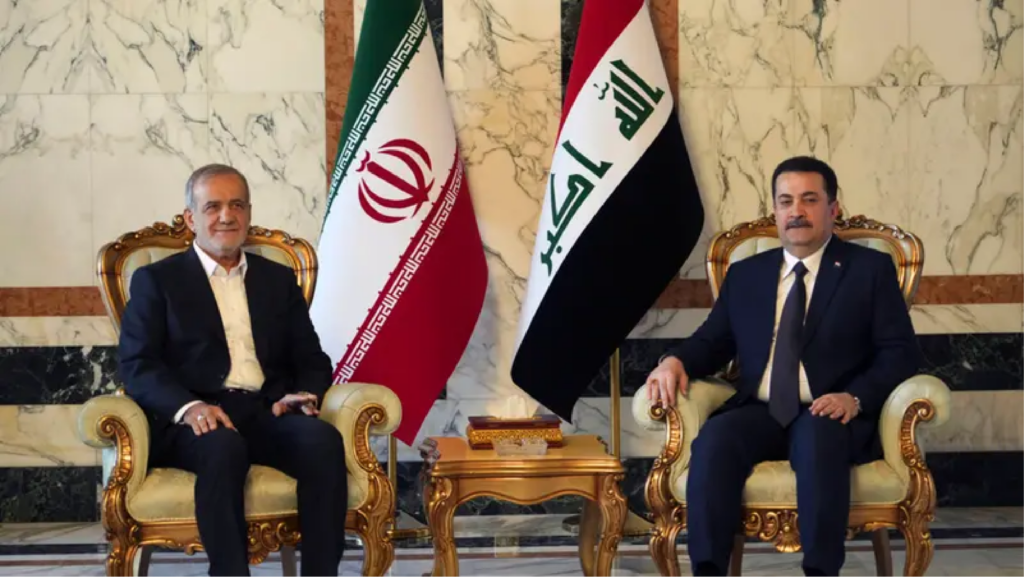It was hardly surprising that the new Iranian president chose Iraq as his first major destination. Iraq serves as the economic lifeline for Iran’s regime, without which the regime would suffocate due to a lack of resources, particularly U.S. dollars. The smuggling of Iranian oil under the guise of Iraqi oil—by blending it with Iraqi crude to alter its specifications—is a well-known practice. The world is fully aware that the smuggling of oil and dollars from Iraq continues at full speed, all while the U.S. administration turns a blind eye, borrowing the familiar phrase from the UN Secretary-General: “We express our deep concern.” This was precisely the sentiment expressed by the U.S. regarding the Iranian president’s visit to Iraq—they were “concerned,” but little more than that.
The primary goal of the visit by the head of the Iranian regime to Iraq was undeniably economic, in addition to ensuring the continuity of the political process and attempting to unify the fragmented parties within the Coordination Framework. This came after a series of scandals that have shaken its members, including the “Theft of the Century,” the railway deal, and the theft of customs deposits. The crises did not stop there, as they also involved spying by the Prime Minister’s office on his associates within the Coordination Framework, as admitted by a member of the ruling Asa’ib Ahl al-Haq militia.
The head of the Iranian regime, Bozshkian, mentioned that “14 memorandums of understanding have been signed regarding cooperation between Iran and Iraq. However, the most important aspect is that to reach a common understanding, teams from both sides will draft long-term strategic plans. It has been agreed that these strategic plans will be signed during future visits.” In reality, this agreement benefits the Iranian side, as Iraq has little to export to Iran or other countries, except for oil, which ends up in the pockets of the ruling regime. Both the Iranian regime and its Iraqi counterpart are following the same path.
The visit was peculiar, as the Iranian president stayed in the Iraqi capital for only six hours before heading to Kurdistan, Basra, Najaf, and Karbala. It remains unclear whether these visits were part of his official itinerary or if he didn’t require prior approval. It seems illogical for a visiting head of state to meet with militias, political parties, and tribal leaders, delivering speeches to promote his government’s perspective, all while giving Iraqis lessons in virtue. Meanwhile, the Iranian people suffer from governmental oppression and the depletion of state funds to support Iranian-sponsored terrorism, which has even reached Africa. The president claimed that “the achievements of this trip are essential for creating a shared language and vision, in line with Khamenei’s policies.” But who is unaware of Khamenei’s policies, rooted in domestic repression and external support for terrorism?
It is no secret that the Iranian president is merely a puppet, with his strings firmly in the hands of the Supreme Leader, who manipulates him at will. Khamenei’s decision to appoint a so-called reformist president was a desperate attempt to alter the perception of the U.S. and the European Union, hoping they would view the regime more favorably by seemingly supporting a reformist over his conservative allies. However, whether the president is a reformist, or a hardliner makes no difference—the real power lies with Khamenei. This move did nothing to change the stance of U.S. presidential candidate Trump, who has already promised Iran even more sanctions once he takes office.
The popular movements in Iran and Iraq have gained real momentum, growing stronger and more intense by the day. Both nations, tragically burdened by the clerics of oppression, are ruled by regimes that stand among the most repressive, tyrannical, racist, sectarian, and brutal in the world—toward both their own people and others. These two regimes feed each other whenever one shows signs of weakness or decay. Both countries are blessed with abundant oil and natural resources, yet their governments have turned these divine gifts into a curse, hoarding the wealth for themselves and using the surplus to spread evil and chaos.
As for the farcical comment regarding his visit to Karbala and the shrine of Imam Hussein, Iranian official Bezkshkian remarked, “I wore a hat and mask during my visit to the holy shrines so as not to disturb the people.” This statement couldn’t be further from the truth. He is well aware that the Iraqi people do not welcome his visit, as public outrage in Iraq has reached its peak—mirroring the deep resentment in Iran against its oppressive regime. To the Iranian president: The reality is that you were a guest of the “Coordination Framework” government, not the Iraqi people. In truth, you were an unwelcome and burdensome guest.
